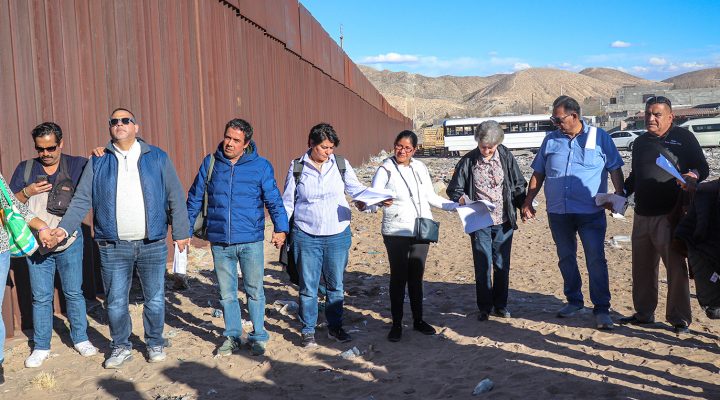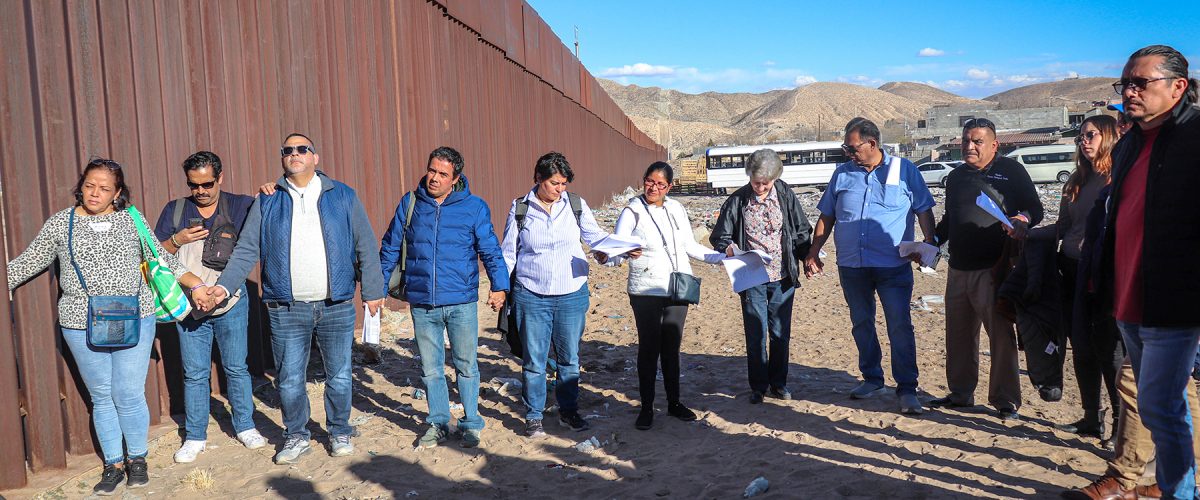An ecumenical network of Caribbean, Latin American and U.S. religious groups expanded its commitment to serving migrants throughout the region during a four-day gathering in Ciudad Juarez, Mexico.
Ruben Ortiz, Latino field ministries coordinator for the Cooperative Baptist Fellowship, served on the organizing committee for the Jan. 30-Feb. 2 meeting of “As Born Among Us” — “Como Nacido entre Nosotros,” in Spanish.
This gathering “marked a milestone in the approach to the migration crisis from a perspective of faith and solidarity,” the organization said. “The event focused on key objectives, such as fostering inter-organizational cooperation, expanding knowledge about the reality of migration and its challenges, and promoting a welcoming approach based on gospel principles.”
Participants represented Baptist, Catholic, Lutheran, Methodist, Pentecostal and Reformed traditions.
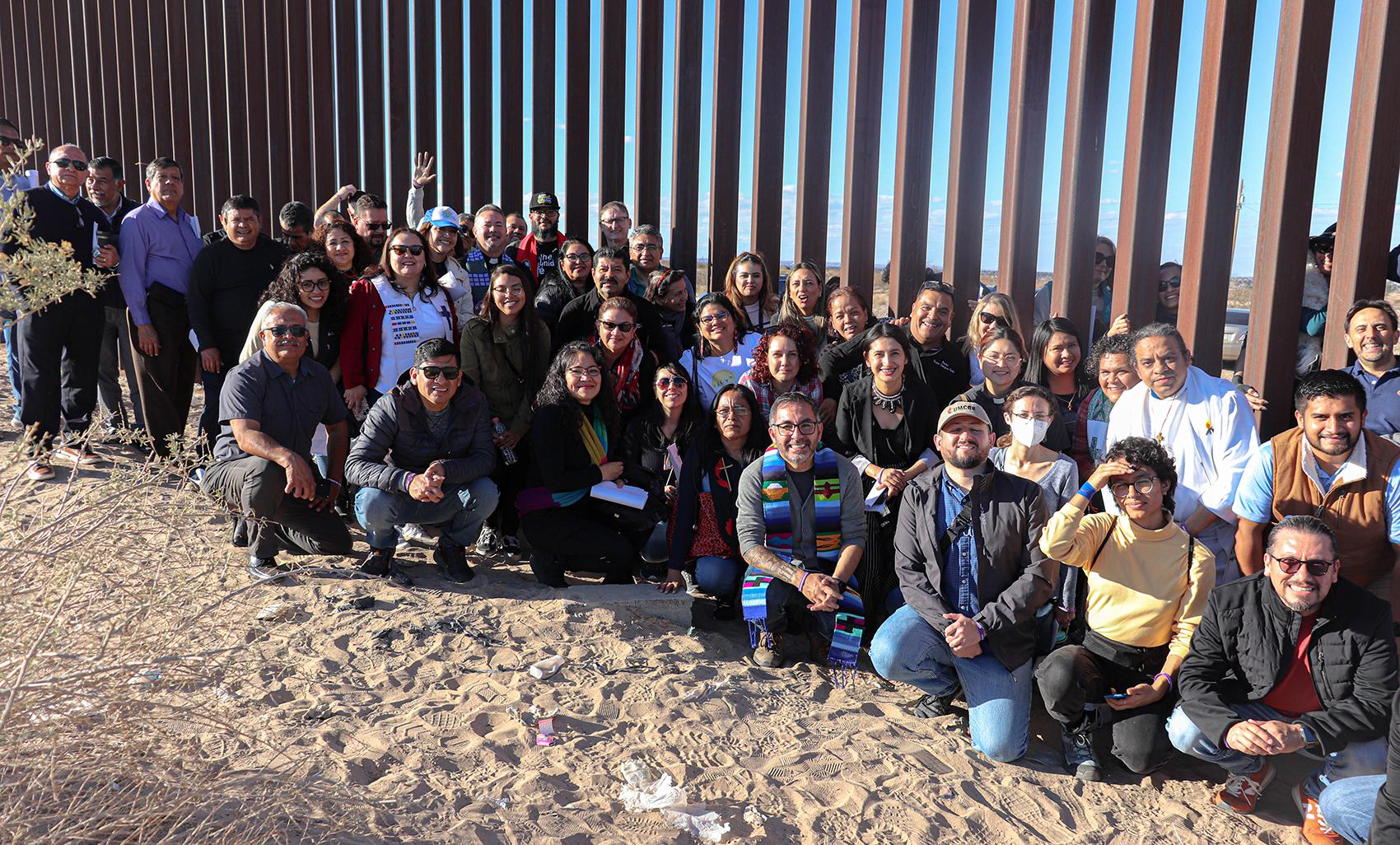
Ecumenical group at the border wall
“Through workshops and plenary sessions, participants delved into crucial issues such as violence in migration, advocacy strategies for migrants’ rights, and the use of digital tools to advocate on migration issues,” the summary explained.
Members also considered a proposal to create new working groups within the network focused on areas such as migration and childhood, women and gender in migration and policy and advocacy, Ortiz said. “This is a first-of-its-kind movement, and now we are expanding our work. We are even looking at how all of this can be applied to the U.S. so the U.S. can become a more welcoming country.”
“As Born Among Us” was founded in 2020 as an ecumenical campaign to address xenophobic rhetoric emanating from many Latin American churches, explained Ortiz, who attended that gathering in Bogota, Colombia.
The network has since gathered in Central and South America. It has developed resources for churches called to serve migrants and launched an app migrants can use to locate supportive congregations in foreign countries.
The network is supported by numerous Christian organizations including CBF, Fellowship Southwest, the International Organization for Migration, Tearfund, the Mennonite Central Committee, Church World Service and Hope Border Institute.
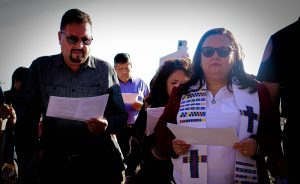
Anyra Cano (right) at the border service.
Among the plenary sessions and workshops offered during the Mexico meeting was a presentation by Fellowship Southwest partner and CBF field personnel Elket Rodriguez. Fellowship Southwest Executive Director Stephen Reeves also addressed the gathering.
A session led by Ortiz explored how the theology inherent in the network’s name can be translated into action by network members. “As Born Among Us” is derived from Leviticus (19:34), which commands people to treat immigrants like fellow citizens.
“I based my plenary on images in the Old Testament and the New Testament that show God as a protector and as a refuge,” he said. “It’s about developing shalom community, Christ community. We want to show our churches how they can become places of protection and refuge.”
Conference participants lived into that vision during a moving worship service held at a wall dividing Mexico and the United States, Reeves said.
“We drove out to the western edge of Juárez and parked our three buses on the side of a bumpy, dusty road. We then walked to the giant rusty iron wall, carrying pages of liturgies and lyrics, a guitar, microphones and an amplifier. Many of the pastors wore collars or stoles.”
The service was attended by about 60 people on the Mexico side of the border, and about 15 on the U.S. side.
Communion was passed back and forth between people on each side of the wall to underscore the common humanity of those in both countries.
“We then began worship with songs, prayers and liturgies led by Anyra Cano, Ruben Ortiz and others. We shared Communion through the wall. Finally, we joined hands in a circle that joined two countries. We were united in our care for those fleeing desperate conditions and suffering persecution and trauma. It was a moving and powerful experience,” Reeves said.
Ortiz said Communion was passed back and forth between people on each side of the wall to underscore the common humanity of those in both countries. “It was a powerful moment for us to touch hands and to see that our community of believers is stronger than any wall. We also created a big circle and held hands between the two sides to show our unity across the border.”
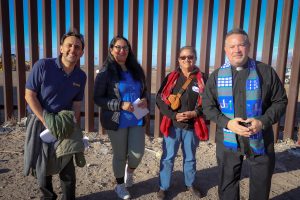
Ruben Ortiz (right) with others at the border service.
Cano, director of programs at Fellowship Southwest, described the conference as spiritually fulfilling. “We spent time dreaming and planning how to work together. There were also times of fellowship, a powerful worship time at the border wall, and breaking bread with new friends from different countries and faith traditions.”
The conference also was highly productive because it brought together migrant advocates from many countries to see the situation along the northern Mexico border, she said. “Fellowship Southwest invited our partners to participate fully in this conference to learn from other ministries, grow their network, and learn of resources available to their ministries, as conferences for practitioners in this work are uncommon.”

